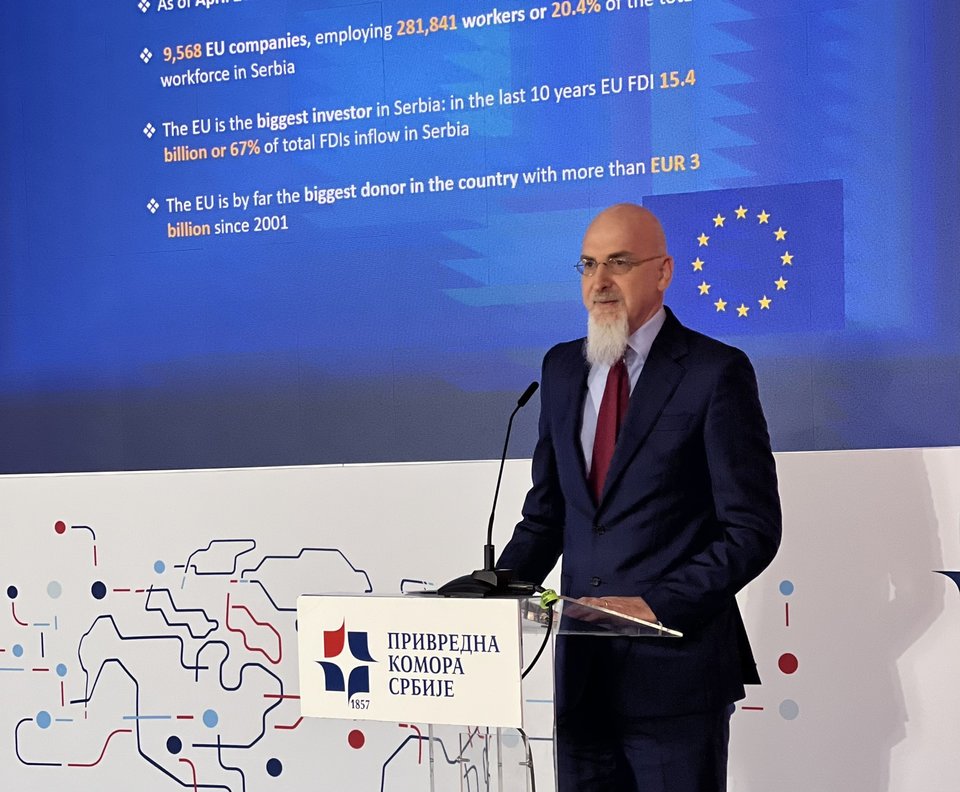Regional Integrations are a Drive for Economic Change and a Shortcut to the EU
Jun 12, 2023.jpg)
The Western Balkans is a region of great economic opportunities, natural potential, and good traditional and innovative industries, which should be part of the European Union as soon as possible. On its way, it has the support of European partners and the United States of America (USA), stated the ambassadors of the USA, EU, and Italy. Christopher Hill, Emanuele Giaufret, and Luca Gori addressed businessmen at the Assembly of the Chamber of Commerce and Industry of Serbia (CCIS).

The ambassadors pointed to the importance of integration in the Western Balkans, facing challenges and solving problems so that the region could become part of the single European market. As they pointed out, the single market was a powerful engine for the creation of wealth and prosperity among EU member states and could already be the engine of economic transformation in the Western Balkans.
_960x720.jpg)
CCIS has an important role on that path, we are changing in order to help both domestic and all economies in the region. We are becoming a modern center for the development of our and the regional economy. "Without a clear vision and strategic partners, we will not be able to move forward quickly," says the President of the CCIS, Marko Čadež.
The Western Balkans, according to Čadež, is the richest in rare metals, such as graphite, and cobalt, and has the world's largest reserves of lithium, good processing capacities, and quality personnel, but a new strategy of inclusion in the European system is needed, so that the region could become, promptly, part of the single economic space and enjoy the four freedoms of the EU.
Our task on this path is to improve the competitiveness of companies, strengthen the digitalization process and connect traditional and modern industries, decarbonization, circular economy, and mobility, supply chains..., said the president of CCIS. According to him, the Serbian private sector is one of the strongest supporters of Serbia's European economic integration, and the numbers speak for themselves about cooperation.
_960x720.jpg)
Last year, Serbia's exports to the EU amounted to 64 percent of total exports, while bilateral trade reached almost 40 billion euros. Investments from the Union make up about 60 percent of total FDI in Serbia, and it is estimated that companies from the EU employ between 280,000 and 300,000 people directly, and much more indirectly, explains Giaufret. He reminded that the European Commission's new plan for improving the Western Balkans integration process, which rests on four pillars - bringing the Western Balkans closer to the EU single market, deepening regional economic integration, speeding up basic reforms, and increasing pre-accession funds.
The Italian Ambassador Italy Luca Gori emphasized that Italian companies and businessmen want to come to Serbia and build new businesses and partnerships due to economic compatibility, and geographical proximity, but also due to favorable business conditions, fiscal and other benefits that are offered.
More than 1,200 Italian companies operate in Serbia, employing 50,000 people and contributing 5.5 percent to Serbia's GDP. "My mission is to boost economic cooperation to a higher level, as well as for our countries to cooperate in advanced technologies in addition to traditional industries, such as textiles and car industry," said Gori and announcing a series of joint business forums and meetings in the coming period.

_960x720.jpg)
LATEST NEWS
